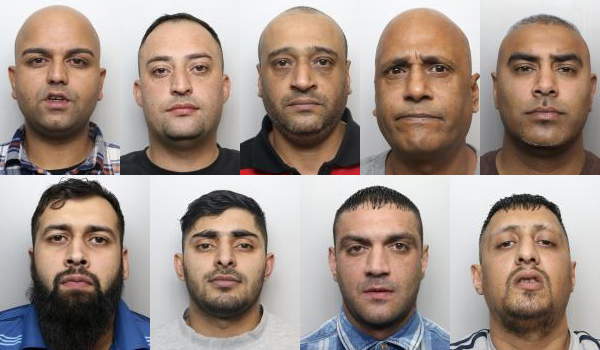Bail reforms that left victims at risk are to be scrapped
Controversial reforms to police bail that slowed the pace of investigations and left victims at increased risk are to be reversed, Home Secretary Priti Patel has announced.
Instead, police officers will be expected to prioritise the safety of victims and the public when considering whether to use bail and will be able to impose strict conditions on the release of domestic abuse and sexual violence suspects.
The overhaul reverses rules brought in less than four years ago, which allowed suspects to be released under investigation (RUI) without any conditions, in a bid to limit the numbers of people spending long periods on bail without being charged.
The law, to be introduced in a Criminal Justice Bill, will be named after Kay Martin, a 49-year-old care worker, whose bricklayer husband Alan Martin, 53, bludgeoned and strangled her to death.
He had been released under investigation by Northumbria Police and even had the keys to his house returned to him after she had accused him of raping and abusing her.
Ms Martin had suffered at least 12 incidents of domestic abuse in the past seven years, prompting Derek Winter, the Sunderland Coroner, to write to Ms Patel calling for greater protection for victims of domestic violence after their attackers are released under investigation.
RUI allows suspects to leave custody after an arrest without any restrictions for an unlimited period of time while inquiries continue, rather than having to comply with conditions such as living at a certain address, not contacting particular people, or regularly visiting a police station.
Figures released under freedom of information laws suggest some 97,000 suspects were released under investigation last year compared to around 6,000 in 2016, according to the Daily Telegraph.
Separate figures obtained by BBC’s Newsnight indicated almost 100,000 suspected violent criminals and sex offenders, including those accused of rape and murder, were released under investigation between April 2017 and October 2019.
In a joint report published last month, Her Majesty’s Inspectorate of Constabulary and Fire and Rescue Services and Her Majesty’s Crown Prosecution Service Inspectorate found victims of serious crimes including domestic abuse were being left at risk because too many suspects are released by police without restrictions – something inspectors branded “extremely worrying”.
Ms Patel said: “I can’t imagine the pain and suffering of the families of victims like Kay Richardson [her maiden name], and I want them to know their voices have been heard. Victims and witnesses of the most distressing crimes – including domestic abuse and sexual violence – must be protected while allegations are investigated.
“It is my priority to deliver justice for victims, and Kay’s Law will put victims at the heart of the bail system, empower police to ensure that suspects are closely monitored and protect the public.”
The reforms will also see the period for which criminal suspects can be bailed increased from 28 days to up to 90 to allow police and prosecutors more time to amass evidence for any prosecution before they have to be released.
National Police Chiefs’ Council lead for bail management, Chief Constable Darren Martland said: “We are committed to doing everything we can to protect victims and witnesses as investigations progress. It’s important to ensure bail is properly used to best effect, which includes respecting the rights of suspects and balancing the impact on victims and witnesses.
“We will continue to work with the Home Office and College of Policing so that we are striking that balance between protecting vulnerable victims and witnesses while upholding the rights of suspects. Our first priority will always be to keep people safe.”
News of the reforms was welcomed by campaigners, who previously warned of the dangers the 2017 changes could pose.
Dame Vera Baird, the Victims’ Commissioner for England and Wales, said: “The Government was warned that this reform could do more harm than good and so it has proved to be. This was a misconceived move, which has been bad for victims. We now need police bail that protects victims and gives the public confidence.”
Ellie Butt, Head of Policy at Refuge said: “Refuge is pleased to see the Government making changes to pre-charge bail. Far too many survivors of domestic and sexual abuse who bravely report crimes to the police see alleged perpetrators released under investigation, meaning there are no restrictions on contacting the survivor.
“This puts many women and children at real risk of harm and is a huge disincentive to reporting. Due to the dynamics of domestic abuse and sexual violence it is vital that bail is used in all cases, we hope these changes will achieve this and will be swiftly passed into law.”
The national chair of the Police Federation of England and Wales, John Apter, said: “These changes to the bail system are much needed and long-overdue. However, we should not have had to campaign to reform the bail system because the disastrous changes to pre-charge bail conditions should never have happened in the first place.
“Despite multiple warnings from the Police Federation and others within policing, these changes were arrogantly pursued by a previous government. Those responsible for driving through those changes with the predictable damage that was caused have failed victims and justice.
“These reforms are welcomed, and it is refreshing to have a government which listened to police officers during the consultation period and acted to give colleagues better support as they carry out investigations.”
The new measures come as the Home Office launches its domestic abuse codeword scheme, to help domestic abuse victims get immediate help from police or other support services. Working with independent pharmacies and Boots pharmacy chains during the new lockdown, the scheme helps ensure victims receive easier access to much needed support from thousands of pharmacies across the UK.







